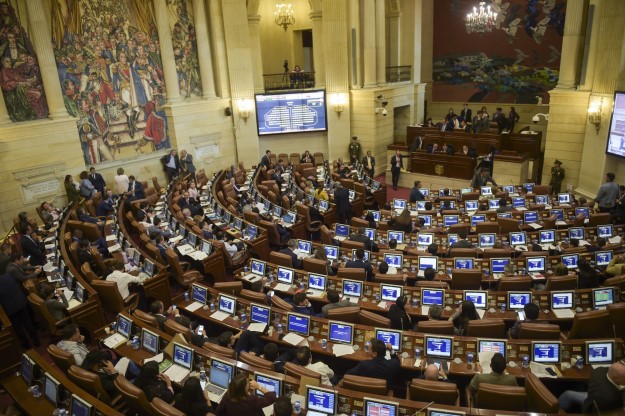A war of words between senator and former President Álvaro Uribe (2002-10) and Senator Gustavo Petro has dominated headlines in Colombia of late. Some disagreement is to be expected, since the two are on opposing sides of the political spectrum. But the nature of their exchange – with Uribe calling Petro a “moral hitman” while Petro defends his revolutionary past – says a lot about Colombia’s current political scenario.
Peace works
The two senators’ sharp words in congress suggest the peace accord is bearing fruit – not the latest agreement signed with the Revolutionary Armed Forces of Colombia (FARC), but the agreement signed with the M-19 in 1990. Petro is a former M-19 member, and his beef with Uribe is a sign that Colombia’s conflict has moved from jungle battlefields to the political realm – where it belongs.
Congress is precisely the right place for an ideological parry between ardent opponents. The agreement with the M-19 guerrillas led to a new constitution in 1991, which gave citizens more power and decentralized the government. The M-19 agreement also gave total amnesty to former guerillas – including Petro – and was widely supported in Congress, including by then-Senator Uribe.
Ironically, the source of the current fight is debate over a component of the Special Jurisdiction for Peace (JEP), a mechanism to rule on war crimes committed by guerrillas and state actors that was created under the peace agreement of 2016. Uribe supports objections to the JEP presented by President Iván Duque, while Petro stands against them.
Colombia remains polarized
The debate between Uribe and Petro also shows that Colombia remains deeply polarized over peace with the FARC. Both proponents and opponents of the agreement have legitimate claims, but the dispute has had the effect of putting implementation on hold.
Duque has not formed a national consensus or succeeded in unifying the country. Nobody said that transition would be easy, but without a moderating voice, the battle of titans taking place in Congress is leading to further polarization and endangers the future of the peace agreement with the FARC – something that the UN has warned could restart the cycle of violence in the country.
Concern over the JEP is one of many qualms that Uribe’s Democratic Center party has raised against the peace agreement signed under former President Juan Manuel Santos. Opponents of the deal won a razor-thin victory in an October 2016 plebiscite and Uribe and his supporters feel that Santos then ignored the popular will after he amended and signed the agreement anyway.
The Democratic Center – in large part running against the accord – took a large share of the vote in legislative elections and won the presidency with Duque in 2018. They now feel they haven’t been able to implement the changes to the agreement that they were elected to enact.
Negotiation matters
Duque has slowly tried to push forward on his campaign promises – in particular those related to the implementation of the peace agreement – but his attention has been almost exclusively focused on members of his governing coalition, without making substantive agreements with the opposition or independents on policy.
By raising objections to the JEP law, Duque forced the parties – particularly those declared independent – to choose sides in the debate. While Duque’s objections solidified his support among the Democratic Center and its base – which had been wavering in its trust in Duque – it has similarly aligned the opposition to confront the government not only on this issue, but also on others related to the implementation of the peace agreement.
In fact, Duque risks aligning parties in Congress against his government unless he is able to make concessions and compromises to carry forward his agenda. There is some good to be drawn from the debate currently raging in Congress, but the president should be wary of it getting out of hand.
—
Guzmán is the director of Colombia Risk Analysis, a political risk consulting firm based in Bogotá. Follow him on Twitter @serguzes and @ColombiaRisk








